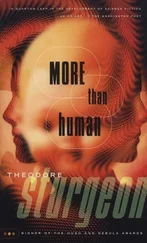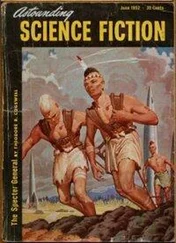Growing more and more wound-up, not realizing what she was doing, she fell to mimicking her husband, something she did often when she was at the end of her rope. Exaggerating her gestures, pulling at her chin, she looked and sounded remarkably like him: “‘Leave it be, precious, it’s all in God’s hands, precious. We cannot change what was meant to be.’”
Then looking to her guests for encouragement and support: “I ask you, gentlemen, should I give up on my Lonia simply because he’s in ‘God’s hands’? And am I to wait for ‘God’ to put him on the train and to bring him home from Lvov? And am I also to believe that that stupid sofa that has been screeching for well over a year is in ‘God’s hands’ too? Will ‘God’ take a hammer to it? Have you ever heard anything so ridiculous? The truth of the matter is I have a lazy, useless husband whose greatest challenge of the day is getting up in the morning.”
Sobakin, in an effort to appear polite, said, “Uh, yes, I agree, the situation regarding your son appears most unfortunate. May I ask, have you had any contact with him?”
Efrosinia’s mouth dropped open. She was struck dumb by Sobakin’s interest in her son, who was a total stranger to him. She suddenly saw in him the answer to all her prayers. Why hadn’t she thought of it from the start? He was an official, a man of distinction, who had connections in all the right places. If anyone could bring her Lonia home, it was Sobakin. Her eyes welling with tears, she looked at him as her savior and said hastily, “We receive a letter about once a week. But it’s always the same: ‘Dear Family, I’m feeling much better and the moment I feel well enough I shall come home’; or ‘Dear Loved Ones, bear with me a little longer’; or ‘My Dear Mamasha , I will be home in a few weeks.’ Every letter we receive is the same, full of hope and promise, but Lonia has yet to show his face. Here, read the letters for yourself.” From a drawer in a small table by the sofa, she brought out a wooden box holding a pile of envelopes tied with string.
Sobakin reluctantly took them from her. The old woman’s complaining had already more than tested his nerves, and he was rapidly losing what little patience he had left. The truth of the matter was, her Lonia was of no concern to him, he couldn’t care less if he was alive or dead. He had come there only to meet the girl. After quickly scanning the room, he started to read the first letter with feigned interest.
“My dear ones, please don’t worry about me, I’m still in the hospital, but any day I expect to be released. A month ago I hemorrhaged and things looked rather grim, but happily my lungs are on the mend and I am almost as good as new. See you soon. Yours, Lonia.”
Sobakin opened other letters and read them aloud. In one, Lonia wrote that he had moved into an apartment on Lichakivsky Street and was even attending classes daily at the university, preparing for exams; in another, Lonia was completely healthy, but not yet able to return home because he was still under observation by doctors at the clinic; in yet another, Lonia was fully recuperated and would be visiting Pinsk very soon.
When Sobakin had finished the last letter, he was in a terrible mood. The girl had not showed up. Fuming, practically throwing the letters on the table, he was ready to leave. He had wasted enough time. As he got up and excused himself, Efrosinia was quick to grab him by the arm. Had she not been in such a state of distress, she would have noticed the anger and resentment in his face. Her voice trembled. “What do you think, Lieutenant? I know the letters are from Lonia, but my daughter Marusia disagrees. She believes they are all forgeries.”
“Marusia?” At the sound of the girl’s name, Sobakin paused. She could make an appearance at any moment. And probably he could win her over by simply pretending to take an interest in her brother, by asking about his studies, his health, or why she thought his letters were forgeries. Yes, that would work. A few minutes passed, but still no sign of the girl. His blood boiled. Where was she? Why hadn’t she come? What if he had missed her? What if she had left to go into town to run errands or visit with friends? He felt his face grow hot with exasperation. He wanted no more of this bothersome family and their trifling problems. Damn them! Forcing a smile, he indulged the old woman one last time.
“If you don’t mind, Mamasha , permit me to copy your son’s address. I understand your profound grief. It’s really unfortunate. However, from his letters it appears that your son is fine and even enjoying his time in Lvov. But then on the other hand, if your daughter believes the letters are forgeries, well, of course, that’s another matter. If she’s here, perhaps I could talk it over with her.” He added, “I’ll personally look into this matter. Within a week I promise you will have your Lonia home with you.”
The old woman was overwhelmed by the NKVD man’s generosity. “Will you really bring my Lonia home? Bless you. Bless you. I will never forget your kindness.” Taking his hands in hers and squeezing them tightly, she whispered with quavering emotion, “Now I understand what being a true Russian means.”
The warmth of Efrosinia’s grip filled Sobakin with loathing and disgust; almost instantly he pulled away. Moving toward the door, he signaled for Nikolai to follow. He was not about to waste a second more of his valuable time. Obviously the girl was not in the house. Storming out of the room, not watching where he was going, he almost collided with someone standing in the hallway by the staircase. She was very pretty, with lips the color of raspberries and there was a penetrating scent of lilac around her. Sobakin stood thunderstruck. It was Marusia! His heart gave a thud. The girl tried to pass, but he blocked her way.
Valentyn, seeing his daughter, hastened to beckon her into the living room. “Marusia, you’ve come in the nick of time.” Then to Sobakin, “Allow me to introduce my daughter, Maria Valentynovna.”
Sobakin, more than delighted, extended his hand. “Simon Stepanovich. I’m pleased to meet you.”
With flushed cheeks, she said quickly, “Is it true? I overheard what you said. Will you really bring my brother home?” She didn’t try to hide the fact that she had been eavesdropping.
“Yes, I will, Maria Valentynovna.” Sobakin liked what he saw: tall, slender, very pretty, a full bosom. “Before the week’s end.” He was seized by a rush of excitement.
Marusia dropped her eyes. She felt confused and disoriented. Sobakin had a penetrating and hungry look in his eyes, as if he were devouring her with them. His powerful presence was everywhere in the room. After a long and terrible moment, to her great relief she caught sight of Nikolai standing by the window. She cried, “Why, Nikolai Nikitich! Good to see you. Just the other day I picked up the Polissian Pravda and read one of your poems. Very curious; in fact, rather surprising.”
Nikolai coughed and said hotly, “Maria Valentynovna, I believe I already made it clear to you on a previous occasion — I no longer go by the name Nikitich. I now use my pseudonym, Kopitkin. A poet of rapidly growing renown such as myself ought not to have a moujik name like Nikitich, but rather a strong, solid Russian one. Hence, the name Kopitkin.”
“Excuse me.” Marusia was embarrassed. “Nikolai Kopitkin, yes, of course, I’m sorry, it must have slipped my mind. As I was saying, I read your poem and was most impressed by it. Your political message was very striking, even uplifting. Quite a change from your usual style, I must say.”
“Yes, that’s correct, Maria Valentynovna.” Nikolai was now more than willing to discuss his craft. He combed his hair back with his palms. “My preoccupation with flowers and nature is over — too bourgeois, too trivial. I now write about the times, about revolution and the inevitability of socialism. I look reality in the face, so to speak.”
Читать дальше












